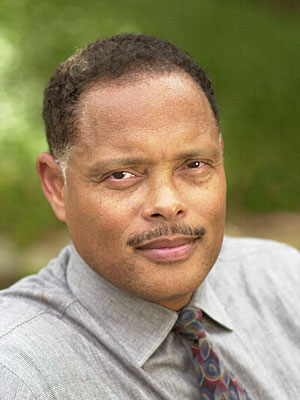Resident fellow Thom Massey, champion of multicultural education, dies at 61
BY MICHAEL PEÑA
Alumnus and Associate Dean of Multicultural Education Thomas James Massey, a cherished member of Stanford's student affairs division known to many across campus simply as "Thom," died unexpectedly in his cottage on campus over the winter break. Massey, also a pillar of the university's black community for decades, was 61.
Massey apparently died of a heart attack on Jan. 1, the last time his computer showed that he checked his blood pressure, according to his son, Tajai Massey. The Santa Clara County Coroner's Office has not yet released an official cause of death.
Upon Massey's death, Vice Provost for Student Affairs Greg Boardman sent out an e-mail to his staff and other resident fellows about the tragic loss of their longtime colleague. "Thom was dedicated to issues of diversity and social justice and had a special interest in conflict resolution," Boardman stated. "His passion was evident in his support of our students and their welfare. He will be greatly missed and our thoughts and prayers are with his family and loved ones."
Over the past four decades, Massey witnessed many milestones that must have resonated deeply with his commitment to diversity at Stanford and its students: the creation of African and African American Studies, the Black Graduation Celebration and the birth of five ethnic community centers on campus.
"While it wasn't Thom's nature to be front and center, he was always working in the background to support multiple communities in his commitment to diversity and inclusion," said Jan Barker-Alexander, associate dean of students and director of the Black Community Services Center. "Thom was unwavering in his support of the growth of our community and was proud of the legacy it continues to build upon—a legacy that he was a part of creating."
Massey earned a bachelor's degree in psychology in 1969, followed by a master's in administration policy analysis in higher education in 1972, both from Stanford. As an undergraduate, he also played football and ran track. Among the numerous positions he held over his career at Stanford were assistant dean of student affairs, assistant director of the Graduate Life Office and, for the past 10 years, resident fellow at Naranja.
"I always admired the passion that guided his work with students, faculty and staff and grounded his presence as a mentor to so many at Stanford over the years," said Associate Vice Provost for Student Affairs Sally Dickson. "He devoted his professional life to student development and to improving the relationships of people from diverse backgrounds so that they are prepared to interact in a diverse world. I will miss collaborating with him on issues of equity and inclusion."
In 2000, when Massey spoke as part of the "What Matters to Me and Why" series, he discussed injecting perspective and balance in Naranja, a house focused on entrepreneurship and filled with business-minded students. His descriptions of dorm life back then made Naranja seem like an incubator of sorts—where, behind any door, students might be launching a startup with nothing more than a laptop.
"It seems to me that one of the things entrepreneurs have to learn more about is how to be ethical and how to be inclusive," Massey, then 53, told the audience in Memorial Church. "They need to know that profit may not be the best motive. It is for me not the only motive."
His involvement in student life extended beyond Naranja as well. Massey championed "Faces of the Community," a highly rated program for New Student Orientation that highlighted the diversity of ethnicity, sexual orientation, physical ability and thought. When he was appointed associate dean of students and multicultural educator in 2003, Massey said he would draw on his many years at Stanford in an effort to bolster diversity education. His expertise in conflict mediation also was cited as a skill that would serve him well in managing acts of campus intolerance.
"He really wanted to encourage cross-cultural communication," said Tajai Massey, who graduated from Stanford in 1997 and now runs a hip hop record label in the Bay Area. "What he instilled in me was to give your best for the sake of giving your best."
Thom Massey had Tajai and a daughter, Julana, with alumna Grace Carroll. They divorced in 1981, and Carroll currently lives in Oakland. Tajai also lives in Oakland, and Julana Massey lives in Ellicott City, Md. Thom Massey also is survived by five grandchildren, ages 1 to 11.
His family invites friends and colleagues to a funeral service to be held on Saturday, Jan. 10, at 1 p.m. in the Mills College Chapel, at 5000 MacArthur Blvd. in Oakland.
Colleagues in the Office of the Vice Provost for Student Affairs have arranged for a memorial service to be held on campus on Tuesday, Jan. 13, at noon in Memorial Church.
The family asks that donations be made to the Black Community Services Center in Massey's name. Checks should be made payable to "Stanford University" with a notation memo that states: “Black House c/o Thom Massey ‘69, MA ’72 Black House Memorial,” and mailed to Henry W. Taylor, Office of Development, Stanford University, Frances C. Arrillaga Alumni Center, 326 Galvez Street, Stanford, CA 94305. Instructions for online giving are available at: https://e.stanfordalumni.org/Clubs/blackalumni/pages.asp?PageID=373.
Donations also may be made in Massey's name to the Mosaic Project, 580 Grand Ave., Suite 303, Oakland, CA 94610; or online at https://mosaicproject.org/donatedollars.


